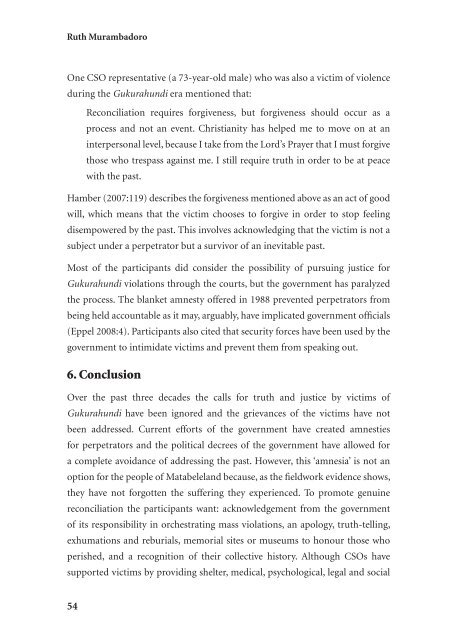ACCORD-ajcr-2015-1
ACCORD-ajcr-2015-1
ACCORD-ajcr-2015-1
- No tags were found...
Create successful ePaper yourself
Turn your PDF publications into a flip-book with our unique Google optimized e-Paper software.
Ruth Murambadoro<br />
One CSO representative (a 73-year-old male) who was also a victim of violence<br />
during the Gukurahundi era mentioned that:<br />
Reconciliation requires forgiveness, but forgiveness should occur as a<br />
process and not an event. Christianity has helped me to move on at an<br />
interpersonal level, because I take from the Lord’s Prayer that I must forgive<br />
those who trespass against me. I still require truth in order to be at peace<br />
with the past.<br />
Hamber (2007:119) describes the forgiveness mentioned above as an act of good<br />
will, which means that the victim chooses to forgive in order to stop feeling<br />
disempowered by the past. This involves acknowledging that the victim is not a<br />
subject under a perpetrator but a survivor of an inevitable past.<br />
Most of the participants did consider the possibility of pursuing justice for<br />
Gukurahundi violations through the courts, but the government has paralyzed<br />
the process. The blanket amnesty offered in 1988 prevented perpetrators from<br />
being held accountable as it may, arguably, have implicated government officials<br />
(Eppel 2008:4). Participants also cited that security forces have been used by the<br />
government to intimidate victims and prevent them from speaking out.<br />
6. Conclusion<br />
Over the past three decades the calls for truth and justice by victims of<br />
Gukurahundi have been ignored and the grievances of the victims have not<br />
been addressed. Current efforts of the government have created amnesties<br />
for perpetrators and the political decrees of the government have allowed for<br />
a complete avoidance of addressing the past. However, this ‘amnesia’ is not an<br />
option for the people of Matabeleland because, as the fieldwork evidence shows,<br />
they have not forgotten the suffering they experienced. To promote genuine<br />
reconciliation the participants want: acknowledgement from the government<br />
of its responsibility in orchestrating mass violations, an apology, truth-telling,<br />
exhumations and reburials, memorial sites or museums to honour those who<br />
perished, and a recognition of their collective history. Although CSOs have<br />
supported victims by providing shelter, medical, psychological, legal and social<br />
54


